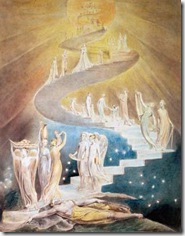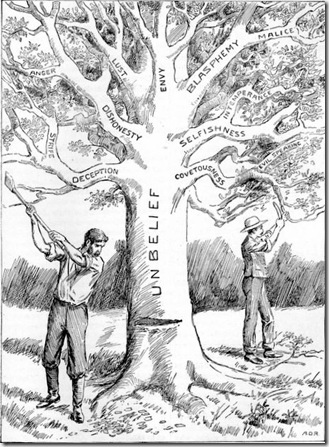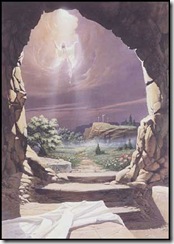I began the day by reading Hebrews 2:10-18. I lingered over these verses and was captured by the frequency of familial words that the author used and the theme of “family likeness” that he emphasizes.
- bringing many children to glory (vs. 10)
- Both the one who makes men holy and those who are made holy are of the same family. (vs. 11)
- Jesus is not ashamed to call them brothers and sisters (vs. 11)
- I will proclaim your name to my brothers and sisters (vs. 12)
- Here am I and the children whom God has given me (vs. 13)
- the children share flesh and blood (vs. 14)
- he had to become like his brothers and sisters in every respect (vs. 17)
 I got a Christmas card with a family photo in it yesterday. Casey’s first words when she saw the picture were, “Boy, Levi sure looks like his Dad!”
I got a Christmas card with a family photo in it yesterday. Casey’s first words when she saw the picture were, “Boy, Levi sure looks like his Dad!”
She was exactly right! The little boy bore a striking resemblance to his father. In fact, the word “likeness” means the quality of resembling, or corresponding to another.Â
I was once again struck by the wonder of Jesus becoming like us in order to make a way for us to become like Him! These verses even delineate what that means:
- It means pursuing holiness–a life set apart for God’s exclusive use. (vs. 11)
- It means being caught up in a life of worship. (vs. 12)
- How cool to see that we sing because Jesus sings praises!
- We proclaim God’s glory because our brother Jesus showed us that was what gives our life significance.
- It means living by faith not sight. (vs. 13)
- It means making ourselves available to serve. (vs. 13)
- It means sharing the suffering of others — identifying ourselves with them in order to help overcome freedom robbing bondage. (vs. 14-15)
- It means helping those who cannot help themselves–not from a place of superiority but from a place of identity (vs. 18)
Amazing that Jesus was not ashamed to become like us.Â
The word “like” means to be “suitable or agreeable to, to feel attraction toward or pleasure in, to wish to have.”Â
Am I ashamed for others to see me agreeable to, taking pleasure in or wishing to have more of Jesus?Â
If my “like” does not result in “like-ness” to brother Jesus…whose likeness will I bear?
“You belong to your father, the devil, and you want to carry out your father’s desire. He was a murderer from the beginning, not holding to the truth, for there is no truth in him. When he lies, he speaks his native language, for he is a liar and the father of lies.” (John 8:44)





